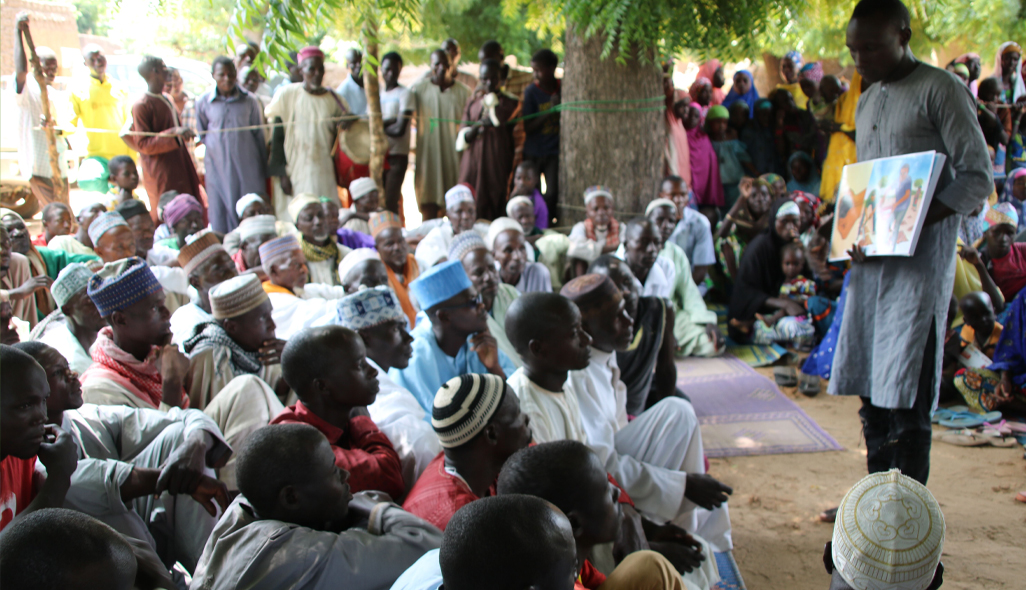Farming + Family Planning = Promising Formula for Resilience
In the face of rapid changes unfolding in one of the most fragile contexts in the world, we can prepare families to take on future challenges.
I write to you at a historically difficult moment. Amidst a global pandemic, countless families around the world face mounting threats to their health, livelihoods, and ability to feed and educate their children. Each threat compounds another. It’s an important reminder: the problems we face are connected.
While the interconnectedness of our challenges can feel overwhelming, these linkages may also give us hope—if we seize opportunities to develop integrated solutions that can transform people’s lives on multiple levels.
As a medical doctor and country director of Pathfinder International in Niger, I know reproductive health doesn’t exist in a vacuum. Healthy timing and spacing of pregnancies, for example, has implications for gender equity, nutrition, family finances, education, natural resources management, and more.
That’s why our team in Niger is committed to thinking beyond the health sector. We’ve seen the results of cross-sectoral partnerships with our own eyes.
I refer specifically to an important pilot intervention called “Building Resilience through Strengthening and Integrating Reproductive Health and Family Planning in Niger” (RISE-FP), funded by USAID and implemented by Pathfinder’s Evidence to Action (E2A) Project, in partnership with Resilience and Economic Growth in Sahel-Enhanced Resilience (REGIS-ER), led by NCBA-CLUSA.
Spotlight on the Sahel: Interconnected Challenges and Incredible Potential
We implemented RISE-FP in Africa’s Sahel region, which features abundant human and natural resources on which rapid economic growth can be built. But our governments and the private sector struggle to keep pace in providing opportunities, education, and services—given the incredibly rapid pace of growth of our population, particularly our youth.
Here, droughts are intensifying, driving food and nutrition crises. Women and children are among those most impacted. Poor access to health services, combined with recurrent epidemics and a lack of access to reproductive and emergency care, are leading to high maternal mortality. Millions of children are at risk of malnutrition and underdevelopment.
Within this region, you’ll also find strong traditional norms and power dynamics that make it tough to change knowledge, attitudes, and behaviors that are deep seated, such as gender inequity, limited use of family planning, and reliance on unsustainable farming techniques.
And in Niger, where…
• almost nine in ten people rely on agriculture,
• fertility levels are among the highest in the world, and
• almost half of Nigerien children are chronically or acutely malnourished
…these issues are inseparable.
National governments across the region are working hard to address these challenges. And our teams at Pathfinder and E2A are committed to collaborating with them to find solutions.
We knew the health sector alone could not meet the needs of these chronically vulnerable households. We sought partners with expertise in food security, farming, and nutrition. Together, and in partnership with the communities we serve, we planned to foster a shared vision of resiliency and bring our respective expertise to the table. We wanted to innovate, find synergies, break through traditional norms, and use our scarce resources as efficiently as possible.
We found such a partner in REGIS-ER—a project focused on conservation farming.
The Path to Inclusive Development
For nine months, across 13 hard-to-reach communities in Zinder Region, RISE-FP, in partnership with REGIS-ER, sought to strengthen the resilience of Nigerien households by increasing information about and the availability of health services, including family planning and nutrition, as well as agriculture services (RISE-FP focused on health and brought E2A and Pathfinder’s expertise in multisectoral integration to the table, while REGIS-ER focused on conservation farming).
Illustration: Community health workers and conservation farmer leaders, trained by the project, used integrated job aids with depictions like the ones above during their outreach and counseling.
By integrating health and agriculture, RISE-FP was able to engage both women and men in new and exciting ways. Men who came to learn about conservation farming stayed for information on contraceptive methods. Women who were counseled on reproductive health and nutrition for their children also learned conservation farming techniques.
“It’s necessary that family planning and conservation farming work together. Because if you do conservation farming and you farm a hectare or a half-hectare, but your family is more than a dozen people, you can’t feed them. But if you have a hectare and you do conservation farming and you only have four children because you space births, you can feed them well and enroll them in school and do other things in your life.”
—Conservation farmer leader from Bandé
You can see all results of the pilot project and recommendations for scale-up here. But for now, I’ll share two quick reflections from RISE-FP that feel relevant to this historic and difficult time we now find ourselves in:
(1) To tackle interconnected and urgent challenges, we need to be extremely creative and practical. We must proactively seek opportunities to collaborate with others and leverage existing activities, seek efficiency, and apply innovation.
(2) When we really collaborate—with communities and across sectors—to envision what makes a family or an individual resilient in the face of changes to their social, economic, and environmental systems, we will achieve more, faster, and better.
I hope this vision for more inclusive, integrated development—as promoted by the RISE-FP project—inspires you now more than ever. I believe it points a way forward.
***



